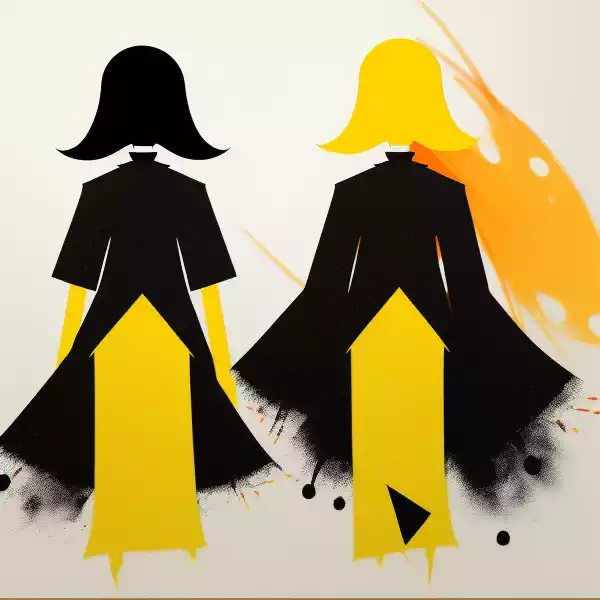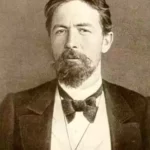 | |
Peasants | |
| Author | Anton Chekhov |
|---|---|
| Published |
1877
|
| Language | English |
| Original Language | Russian |
| Nationality | Russian |
| Genre | Realism |
1877 Short Story
Peasants
Peasants is an English Realism short story by Russian writer Anton Chekhov. It was first published in 1877.
Peasants
by Anton Chekhov
I
NIKOLAY TCHIKILDYEEV, a waiter in the Moscow hotel, Slavyansky Bazaar, was taken ill. His legs went numb and his gait was affected, so that on one occasion, as he was going along the corridor, he tumbled and fell down with a tray full of ham and peas. He had to leave his job. All his own savings and his wife’s were spent on doctors and medicines; they had nothing left to live upon. He felt dull with no work to do, and he made up his mind he must go home to the village. It is better to be ill at home, and living there is cheaper; and it is a true saying that the walls of home are a help.
He reached Zhukovo towards evening. In his memories of childhood he had pictured his home as bright, snug, comfortable. Now, going into the hut, he was positively frightened; it was so dark, so crowded, so unclean. His wife Olga and his daughter Sasha, who had come with him, kept looking in bewilderment at the big untidy stove, which filled up almost half the hut and was black with soot and flies. What lots of flies! The stove was on one side, the beams lay slanting on the walls, and it looked as though the hut were just going to fall to pieces. In the corner, facing the door, under the holy images, bottle labels and newspaper cuttings were stuck on the walls instead of pictures. The poverty, the poverty! Of the grown-up people there were none at home; all were at work at the harvest. On the stove was sitting a white-headed girl of eight, unwashed and apathetic; she did not even glance at them as they came in. On the floor a white cat was rubbing itself against the oven fork.
“Puss, puss!” Sasha called to her. “Puss!”
“She can’t hear,” said the little girl; “she has gone deaf.”
“How is that?”
“Oh, she was beaten.”
Nikolay and Olga realized from the first glance what life was like here, but said nothing to one another; in silence they put down their bundles, and went out into the village street. Their hut was the third from the end, and seemed the very poorest and oldest-looking; the second was not much better; but the last one had an iron roof, and curtains in the windows. That hut stood apart, not enclosed; it was a tavern. The huts were in a single row, and the whole of the little village — quiet and dreamy, with willows, elders, and mountain-ash trees peeping out from the yards — had an attractive look.
Beyond the peasants homesteads there was a slope down to the river, so steep and precipitous that huge stones jutted out bare here and there through the clay. Down the slope, among the stones and holes dug by the potters, ran winding paths; bits of broken pottery, some brown, some red, lay piled up in heaps, and below there stretched a broad, level, bright green meadow, from which the hay had been already carried, and in which the peasants’ cattle were wandering. The river, three-quarters of a mile from the village, ran twisting and turning, with beautiful leafy banks; beyond it was again a broad meadow, a herd of cattle, long strings of white geese; then, just as on the near side, a steep ascent uphill, and on the top of the hill a hamlet, and a church with five domes, and at a little distance the manor-house.
“It’s lovely here in your parts!” said Olga, crossing herself at the sight of the church. “What space, oh Lord!”
Just at that moment the bell began ringing for service (it was Saturday evening). Two little girls, down below, who were dragging up a pail of water, looked round at the church to listen to the bell.
“At this time they are serving the dinners at the Slavyansky Bazaar,” said Nikolay dreamily.
Sitting on the edge of the slope, Nikolay and Olga watched the sun setting, watched the gold and crimson sky reflected in the river, in the church windows, and in the whole air — which was soft and still and unutterably pure as it never was in Moscow. And when the sun had set the flocks and herds passed, bleating and lowing; geese flew across from the further side of the river, and all sank into silence; the soft light died away in the air, and the dusk of evening began quickly moving down upon them.
Meanwhile Nikolay’s father and mother, two gaunt, bent, toothless old people, just of the same height, came back. The women — the sisters-in-law Marya and Fyokla — who had been working on the landowner’s estate beyond the river, arrived home, too. Marya, the wife of Nikolay’s brother Kiryak, had six children, and Fyokla, the wife of Nikolay’s brother Denis — who had gone for a soldier — had two; and when Nikolay, going into the hut, saw all the family, all those bodies big and little moving about on the lockers, in the hanging cradles and in all the corners, and when he saw the greed with which the old father and the women ate the black bread, dipping it in water, he realized he had made a mistake in coming here, sick, penniless, and with a family, too — a great mistake!
“And where is Kiryak?” he asked after they had exchanged greetings.
“He is in service at the merchant’s,” answered his father; “a keeper in the woods. He is not a bad peasant, but too fond of his glass.”
“He is no great help!” said the old woman tearfully. “Our men are a grievous lot; they bring nothing into the house, but take plenty out. Kiryak drinks, and so does the old man; it is no use hiding a sin; he knows his way to the tavern. The Heavenly Mother is wroth.”
In honour of the visitors they brought out the samovar. The tea smelt of fish; the sugar was grey and looked as though it had been nibbled; cockroaches ran to and fro over the bread and among the crockery. It was disgusting to drink, and the conversation was disgusting, too — about nothing but poverty and illnesses. But before they had time to empty their first cups there came a loud, prolonged, drunken shout from the yard:
“Ma-arya!”
“It looks as though Kiryak were coming,” said the old man. “Speak of the devil.”
All were hushed. And again, soon afterwards, the same shout, coarse and drawn-out as though it came out of the earth:
“Ma-arya!”
Marya, the elder sister-in-law, turned pale and huddled against the stove, and it was strange to see the look of terror on the face of the strong, broad-shouldered, ugly woman. Her daughter, the child who had been sitting on the stove and looked so apathetic, suddenly broke into loud weeping.
“What are you howling for, you plague?” Fyokla, a handsome woman, also strong and broad-shouldered, shouted to her. “He won’t kill you, no fear!”
From his old father Nikolay learned that Marya was afraid to live in the forest with Kiryak, and that when he was drunk he always came for her, made a row, and beat her mercilessly.
“Ma-arya!” the shout sounded close to the door.
“Protect me, for Christ’s sake, good people!” faltered Marya, breathing as though she had been plunged into very cold water. “Protect me, kind people. . . .”
All the children in the hut began crying, and looking at them, Sasha, too, began to cry. They heard a drunken cough, and a tall, black-bearded peasant wearing a winter cap came into the hut, and was the more terrible because his face could not be seen in the dim light of the little lamp. It was Kiryak. Going up to his wife, he swung his arm and punched her in the face with his fist. Stunned by the blow, she did not utter a sound, but sat down, and her nose instantly began bleeding.
“What a disgrace! What a disgrace!” muttered the old man, clambering up on to the stove. “Before visitors, too! It’s a sin!”
The old mother sat silent, bowed, lost in thought; Fyokla rocked the cradle.
Evidently conscious of inspiring fear, and pleased at doing so, Kiryak seized Marya by the arm, dragged her towards the door, and bellowed like an animal in order to seem still more terrible; but at that moment he suddenly caught sight of the visitors and stopped.
“Oh, they have come, . . .” he said, letting his wife go; “my own brother and his family. . . .”
Staggering and opening wide his red, drunken eyes, he said his prayer before the image and went on:
“My brother and his family have come to the parental home . . . from Moscow, I suppose. The great capital Moscow, to be sure, the mother of cities. . . . Excuse me.”
He sank down on the bench near the samovar and began drinking tea, sipping it loudly from the saucer in the midst of general silence. . . . He drank off a dozen cups, then reclined on the bench and began snoring.
They began going to bed. Nikolay, as an invalid, was put on the stove with his old father; Sasha lay down on the floor, while Olga went with the other women into the barn.
“Aye, aye, dearie,” she said, lying down on the hay beside Marya; “you won’t mend your trouble with tears. Bear it in patience, that is all. It is written in the Scriptures: ‘If anyone smite thee on the right cheek, offer him the left one also.’ . . . Aye, aye, dearie.”
Then in a low singsong murmur she told them about Moscow, about her own life, how she had been a servant in furnished lodgings.
“And in Moscow the houses are big, built of brick,” she said; “and there are ever so many churches, forty times forty, dearie; and they are all gentry in the houses, so handsome and so proper!”
Marya told her that she had not only never been in Moscow, but had not even been in their own district town; she could not read or write, and knew no prayers, not even “Our Father.” Both she and Fyokla, the other sister-in-law, who was sitting a little way off listening, were extremely ignorant and could understand nothing. They both disliked their husbands; Marya was afraid of Kiryak, and whenever he stayed with her she was shaking with fear, and always got a headache from the fumes of vodka and tobacco with which he reeked. And in answer to the question whether she did not miss her husband, Fyokla answered with vexation:
“Miss him!”
They talked a little and sank into silence.
It was cool, and a cock crowed at the top of his voice near the barn, preventing them from sleeping. When the bluish morning light was already peeping through all the crevices, Fyokla got up stealthily and went out, and then they heard the sound of her bare feet running off somewhere.
II
Olga went to church, and took Marya with her. As they went down the path towards the meadow both were in good spirits. Olga liked the wide view, and Marya felt that in her sister-in-law she had someone near and akin to her. The sun was rising. Low down over the meadow floated a drowsy hawk. The river looked gloomy; there was a haze hovering over it here and there, but on the further bank a streak of light already stretched across the hill. The church was gleaming, and in the manor garden the rooks were cawing furiously.
“The old man is all right,” Marya told her, “but Granny is strict; she is continually nagging. Our own grain lasted till Carnival. We buy flour now at the tavern. She is angry about it; she says we eat too much.”
“Aye, aye, dearie! Bear it in patience, that is all. It is written: ‘Come unto Me, all ye that labour and are heavy laden.’ ”
Olga spoke sedately, rhythmically, and she walked like a pilgrim woman, with a rapid, anxious step. Every day she read the gospel, read it aloud like a deacon; a great deal of it she did not understand, but the words of the gospel moved her to tears, and words like “forasmuch as” and “verily” she pronounced with a sweet flutter at her heart. She believed in God, in the Holy Mother, in the Saints; she believed one must not offend anyone in the world — not simple folks, nor Germans, nor gypsies, nor Jews — and woe even to those who have no compassion on the beasts. She believed this was written in the Holy Scriptures; and so, when she pronounced phrases from Holy Writ, even though she did not understand them, her face grew softened, compassionate, and radiant.
“What part do you come from?” Marya asked her.
“I am from Vladimir. Only I was taken to Moscow long ago, when I was eight years old.”
They reached the river. On the further side a woman was standing at the water’s edge, undressing.
“It’s our Fyokla,” said Marya, recognizing her. “She has been over the river to the manor yard. To the stewards. She is a shameless hussy and foul-mouthed — fearfully!”
Fyokla, young and vigorous as a girl, with her black eyebrows and her loose hair, jumped off the bank and began splashing the water with her feet, and waves ran in all directions from her.
“Shameless — dreadfully!” repeated Marya.
The river was crossed by a rickety little bridge of logs, and exactly below it in the clear, limpid water was a shoal of broad-headed mullets. The dew was glistening on the green bushes that looked into the water. There was a feeling of warmth; it was comforting! What a lovely morning! And how lovely life would have been in this world, in all likelihood, if it were not for poverty, horrible, hopeless poverty, from which one can find no refuge! One had only to look round at the village to remember vividly all that had happened the day before, and the illusion of happiness which seemed to surround them vanished instantly.
They reached the church. Marya stood at the entrance, and did not dare to go farther. She did not dare to sit down either. Though they only began ringing for mass between eight and nine, she remained standing the whole time.
While the gospel was being read the crowd suddenly parted to make way for the family from the great house. Two young girls in white frocks and wide-brimmed hats walked in; with them a chubby, rosy boy in a sailor suit. Their appearance touched Olga; she made up her mind from the first glance that they were refined, well-educated, handsome people. Marya looked at them from under her brows, sullenly, dejectedly, as though they were not human beings coming in, but monsters who might crush her if she did not make way for them.
And every time the deacon boomed out something in his bass voice she fancied she heard “Ma-arya!” and she shuddered.
III
The arrival of the visitors was already known in the village, and directly after mass a number of people gathered together in the hut. The Leonytchevs and Matvyeitchevs and the Ilyitchovs came to inquire about their relations who were in service in Moscow. All the lads of Zhukovo who could read and write were packed off to Moscow and hired out as butlers or waiters (while from the village on the other side of the river the boys all became bakers), and that had been the custom from the days of serfdom long ago when a certain Luka Ivanitch, a peasant from Zhukovo, now a legendary figure, who had been a waiter in one of the Moscow clubs, would take none but his fellow-villagers into his service, and found jobs for them in taverns and restaurants; and from that time the village of Zhukovo was always called among the inhabitants of the surrounding districts Slaveytown. Nikolay had been taken to Moscow when he was eleven, and Ivan Makaritch, one of the Matvyeitchevs, at that time a headwaiter in the “Hermitage” garden, had put him into a situation. And now, addressing the Matvyeitchevs, Nikolay said emphatically:
“Ivan Makaritch was my benefactor, and I am bound to pray for him day and night, as it is owing to him I have become a good man.”
“My good soul!” a tall old woman, the sister of Ivan Makaritch, said tearfully, “and not a word have we heard about him, poor dear.”
“In the winter he was in service at Omon’s, and this season there was a rumour he was somewhere out of town, in gardens. . . . He has aged! In old days he would bring home as much as ten roubles a day in the summer-time, but now things are very quiet everywhere. The old man frets.”
The women looked at Nikolay’s feet, shod in felt boots, and at his pale face, and said mournfully:
“You are not one to get on, Nikolay Osipitch; you are not one to get on! No, indeed!”
And they all made much of Sasha. She was ten years old, but she was little and very thin, and might have been taken for no more than seven. Among the other little girls, with their sunburnt faces and roughly cropped hair, dressed in long faded smocks, she with her white little face, with her big dark eyes, with a red ribbon in her hair, looked funny, as though she were some little wild creature that had been caught and brought into the hut.
“She can read, too,” Olga said in her praise, looking tenderly at her daughter. “Read a little, child!” she said, taking the gospel from the corner. “You read, and the good Christian people will listen.”
The testament was an old and heavy one in leather binding, with dog’s-eared edges, and it exhaled a smell as though monks had come into the hut. Sasha raised her eyebrows and began in a loud rhythmic chant:
” ‘And the angel of the Lord . . . appeared unto Joseph, saying unto him: Rise up, and take the Babe and His mother.’ ”
“The Babe and His mother,” Olga repeated, and flushed all over with emotion.
” ‘And flee into Egypt, . . . and tarry there until such time as . . .’ ”
At the word “tarry” Olga could not refrain from tears. Looking at her, Marya began to whimper, and after her Ivan Makaritch’s sister. The old father cleared his throat, and bustled about to find something to give his grand-daughter, but, finding nothing, gave it up with a wave of his hand. And when the reading was over the neighbours dispersed to their homes, feeling touched and very much pleased with Olga and Sasha.
As it was a holiday, the family spent the whole day at home. The old woman, whom her husband, her daughters-in-law, her grandchildren all alike called Granny, tried to do everything herself; she heated the stove and set the samovar with her own hands, even waited at the midday meal, and then complained that she was worn out with work. And all the time she was uneasy for fear someone should eat a piece too much, or that her husband and daughters-in-law would sit idle. At one time she would hear the tavern-keeper’s geese going at the back of the huts to her kitchen-garden, and she would run out of the hut with a long stick and spend half an hour screaming shrilly by her cabbages, which were as gaunt and scraggy as herself; at another time she fancied that a crow had designs on her chickens, and she rushed to attack it with loud words of abuse. She was cross and grumbling from morning till night. And often she raised such an outcry that passers-by stopped in the street.
She was not affectionate towards the old man, reviling him as a lazy-bones and a plague. He was not a responsible, reliable peasant, and perhaps if she had not been continually nagging at him he would not have worked at all, but would have simply sat on the stove and talked. He talked to his son at great length about certain enemies of his, complained of the insults he said he had to put up with every day from the neighbours, and it was tedious to listen to him.
“Yes,” he would say, standing with his arms akimbo, “yes. . . . A week after the Exaltation of the Cross I sold my hay willingly at thirty kopecks a pood. . . . Well and good. . . . So you see I was taking the hay in the morning with a good will; I was interfering with no one. In an unlucky hour I see the village elder, Antip Syedelnikov, coming out of the tavern. ‘Where are you taking it, you ruffian?’ says he, and takes me by the ear.”
Kiryak had a fearful headache after his drinking bout, and was ashamed to face his brother.
“What vodka does! Ah, my God!” he muttered, shaking his aching head. “For Christ’s sake, forgive me, brother and sister; I’m not happy myself.”
As it was a holiday, they bought a herring at the tavern and made a soup of the herring’s head. At midday they all sat down to drink tea, and went on drinking it for a long time, till they were all perspiring; they looked positively swollen from the tea-drinking, and after it began sipping the broth from the herring’s head, all helping themselves out of one bowl. But the herring itself Granny had hidden.
In the evening a potter began firing pots on the ravine. In the meadow below the girls got up a choral dance and sang songs. They played the concertina. And on the other side of the river a kiln for baking pots was lighted, too, and the girls sang songs, and in the distance the singing sounded soft and musical. The peasants were noisy in and about the tavern. They were singing with drunken voices, each on his own account, and swearing at one another, so that Olga could only shudder and say:
“Oh, holy Saints!”
She was amazed that the abuse was incessant, and those who were loudest and most persistent in this foul language were the old men who were so near their end. And the girls and children heard the swearing, and were not in the least disturbed by it, and it was evident that they were used to it from their cradles.
It was past midnight, the kilns on both sides of the river were put out, but in the meadow below and in the tavern the merrymaking still went on. The old father and Kiryak, both drunk, walking arm-in-arm and jostling against each other’s shoulders, went to the barn where Olga and Marya were lying.
“Let her alone,” the old man persuaded him; “let her alone. . . . She is a harmless woman. . . . It’s a sin. . . .”
“Ma-arya! ” shouted Kiryak.
“Let her be. . . . It’s a sin. . . . She is not a bad woman.”
Both stopped by the barn and went on.
“I lo-ove the flowers of the fi-ield,” the old man began singing suddenly in a high, piercing tenor. “I lo-ove to gather them in the meadows!”
Then he spat, and with a filthy oath went into the hut.
IV
Granny put Sasha by her kitchen-garden and told her to keep watch that the geese did not go in. It was a hot August day. The tavernkeeper’s geese could make their way into the kitchen-garden by the backs of the huts, but now they were busily engaged picking up oats by the tavern, peacefully conversing together, and only the gander craned his head high as though trying to see whether the old woman were coming with her stick. The other geese might come up from below, but they were now grazing far away the other side of the river, stretched out in a long white garland about the meadow. Sasha stood about a little, grew weary, and, seeing that the geese were not coming, went away to the ravine.
There she saw Marya’s eldest daughter Motka, who was standing motionless on a big stone, staring at the church. Marya had given birth to thirteen children, but she only had six living, all girls, not one boy, and the eldest was eight. Motka in a long smock was standing barefooted in the full sunshine; the sun was blazing down right on her head, but she did not notice that, and seemed as though turned to stone. Sasha stood beside her and said, looking at the church:
“God lives in the church. Men have lamps and candles, but God has little green and red and blue lamps like little eyes. At night God walks about the church, and with Him the Holy Mother of God and Saint Nikolay, thud, thud, thud! . . . And the watchman is terrified, terrified! Aye, aye, dearie,” she added, imitating her mother. “And when the end of the world comes all the churches will be carried up to heaven.”
“With the-ir be-ells?” Motka asked in her deep voice, drawling every syllable.
“With their bells. And when the end of the world comes the good will go to Paradise, but the angry will burn in fire eternal and unquenchable, dearie. To my mother as well as to Marya God will say: ‘You never offended anyone, and for that go to the right to Paradise’; but to Kiryak and Granny He will say: ‘You go to the left into the fire.’ And anyone who has eaten meat in Lent will go into the fire, too.”
She looked upwards at the sky, opening wide her eyes, and said:
“Look at the sky without winking, you will see angels.”
Motka began looking at the sky, too, and a minute passed in silence.
“Do you see them?” asked Sasha.
“I don’t,” said Motka in her deep voice.
“But I do. Little angels are flying about the sky and flap, flap with their little wings as though they were gnats.”
Motka thought for a little, with her eyes on the ground, and asked:
“Will Granny burn?”
“She will, dearie.”
From the stone an even gentle slope ran down to the bottom, covered with soft green grass, which one longed to lie down on or to touch with one’s hands. . . Sasha lay down and rolled to the bottom. Motka with a grave, severe face, taking a deep breath, lay down, too, and rolled to the bottom, and in doing so tore her smock from the hem to the shoulder.
“What fun it is!” said Sasha, delighted.
They walked up to the top to roll down again, but at that moment they heard a shrill, familiar voice. Oh, how awful it was! Granny, a toothless, bony, hunchbacked figure, with short grey hair which was fluttering in the wind, was driving the geese out of the kitchen-garden with a long stick, shouting.
“They have trampled all the cabbages, the damned brutes! I’d cut your throats, thrice accursed plagues! Bad luck to you!”
She saw the little girls, flung down the stick and picked up a switch, and, seizing Sasha by the neck with her fingers, thin and hard as the gnarled branches of a tree, began whipping her. Sasha cried with pain and terror, while the gander, waddling and stretching his neck, went up to the old woman and hissed at her, and when he went back to his flock all the geese greeted him approvingly with “Ga-ga-ga!” Then Granny proceeded to whip Motka, and in this Motka’s smock was torn again. Feeling in despair, and crying loudly, Sasha went to the hut to complain. Motka followed her; she, too, was crying on a deeper note, without wiping her tears, and her face was as wet as though it had been dipped in water.
“Holy Saints!” cried Olga, aghast, as the two came into the hut. “Queen of Heaven!”
Sasha began telling her story, while at the same time Granny walked in with a storm of shrill cries and abuse; then Fyokla flew into a rage, and there was an uproar in the hut.
“Never mind, never mind!” Olga, pale and upset, tried to comfort them, stroking Sasha’s head. “She is your grandmother; it’s a sin to be angry with her. Never mind, my child.”
Nikolay, who was worn out already by the everlasting hubbub, hunger, stifling fumes, filth, who hated and despised the poverty, who was ashamed for his wife and daughter to see his father and mother, swung his legs off the stove and said in an irritable, tearful voice, addressing his mother:
“You must not beat her! You have no right to beat her!”
“You lie rotting on the stove, you wretched creature!” Fyokla shouted at him spitefully. “The devil brought you all on us, eating us out of house and home.”
Sasha and Motka and all the little girls in the hut huddled on the stove in the corner behind Nikolay’s back, and from that refuge listened in silent terror, and the beating of their little hearts could be distinctly heard. Whenever there is someone in a family who has long been ill, and hopelessly ill, there come painful moments when all timidly, secretly, at the bottom of their hearts long for his death; and only the children fear the death of someone near them, and always feel horrified at the thought of it. And now the children, with bated breath, with a mournful look on their faces, gazed at Nikolay and thought that he was soon to die; and they wanted to cry and to say something friendly and compassionate to him.
He pressed close to Olga, as though seeking protection, and said to her softly in a quavering voice:
“Olya darling, I can’t stay here longer. It’s more than I can bear. For God’s sake, for Christ’s sake, write to your sister Klavdia Abramovna. Let her sell and pawn everything she has; let her send us the money. We will go away from here. Oh, Lord,” he went on miserably, “to have one peep at Moscow! If I could see it in my dreams, the dear place!
And when the evening came on, and it was dark in the hut, it was so dismal that it was hard to utter a word. Granny, very ill-tempered, soaked some crusts of rye bread in a cup, and was a long time, a whole hour, sucking at them. Marya, after milking the cow, brought in a pail of milk and set it on a bench; then Granny poured it from the pail into a jug just as slowly and deliberately, evidently pleased that it was now the Fast of the Assumption, so that no one would drink milk and it would be left untouched. And she only poured out a very little in a saucer for Fyokla’s baby. When Marya and she carried the jug down to the cellar Motka suddenly stirred, clambered down from the stove, and going to the bench where stood the wooden cup full of crusts, sprinkled into it some milk from the saucer.
Granny, coming back into the hut, sat down to her soaked crusts again, while Sasha and Motka, sitting on the stove, gazed at her, and they were glad that she had broken her fast and now would go to hell. They were comforted and lay down to sleep, and Sasha as she dozed off to sleep imagined the Day of Judgment: a huge fire was burning, somewhat like a potter’s kiln, and the Evil One, with horns like a cow’s, and black all over, was driving Granny into the fire with a long stick, just as Granny herself had been driving the geese.
V
On the day of the Feast of the Assumption, between ten and eleven in the evening, the girls and lads who were merrymaking in the meadow suddenly raised a clamour and outcry, and ran in the direction of the village; and those who were above on the edge of the ravine could not for the first moment make out what was the matter.
“Fire! Fire!” they heard desperate shouts from below. “The village is on fire!”
Those who were sitting above looked round, and a terrible and extraordinary spectacle met their eyes. On the thatched roof of one of the end cottages stood a column of flame, seven feet high, which curled round and scattered sparks in all directions as though it were a fountain. And all at once the whole roof burst into bright flame, and the crackling of the fire was audible.
The light of the moon was dimmed, and the whole village was by now bathed in a red quivering glow: black shadows moved over the ground, there was a smell of burning, and those who ran up from below were all gasping and could not speak for trembling; they jostled against each other, fell down, and they could hardly see in the unaccustomed light, and did not recognize each other. It was terrible. What seemed particularly dreadful was that doves were flying over the fire in the smoke; and in the tavern, where they did not yet know of the fire, they were still singing and playing the concertina as though there were nothing the matter.
“Uncle Semyon’s on fire,” shouted a loud, coarse voice.
Marya was fussing about round her hut, weeping and wringing her hands, while her teeth chattered, though the fire was a long way off at the other end of the village. Nikolay came out in high felt boots, the children ran out in their little smocks. Near the village constable’s hut an iron sheet was struck. Boom, boom, boom! . . . floated through the air, and this repeated, persistent sound sent a pang to the heart and turned one cold. The old women stood with the holy ikons. Sheep, calves, cows were driven out of the back-yards into the street; boxes, sheepskins, tubs were carried out. A black stallion, who was kept apart from the drove of horses because he kicked and injured them, on being set free ran once or twice up and down the village, neighing and pawing the ground; then suddenly stopped short near a cart and began kicking it with his hind-legs.
They began ringing the bells in the church on the other side of the river.
Near the burning hut it was hot and so light that one could distinctly see every blade of grass. Semyon, a red-haired peasant with a long nose, wearing a reefer-jacket and a cap pulled down right over his ears, sat on one of the boxes which they had succeeded in bringing out: his wife was lying on her face, moaning and unconscious. A little old man of eighty, with a big beard, who looked like a gnome — not one of the villagers, though obviously connected in some way with the fire — walked about bareheaded, with a white bundle in his arms.







